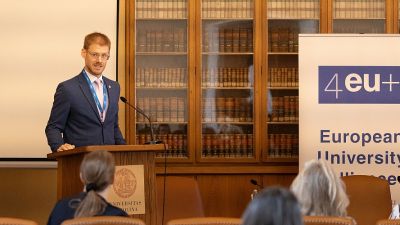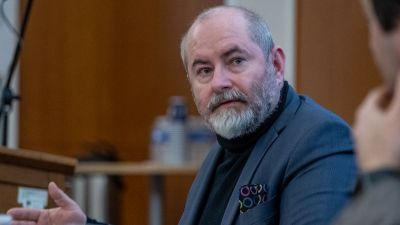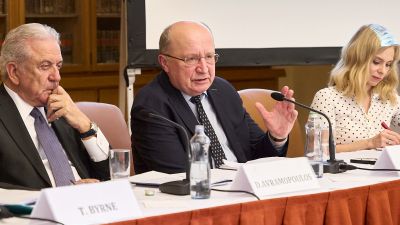This week, Charles University hosted the annual CEDMO conference, highlighting the observatory’s ongoing commitment to fact-checking, media literacy, and responsible AI regulation. The CEDMO consortium—affiliated with the university's Faculty of Social Sciences and comprising international partners—continues to deliver crucial research, evidence, and insights into the challenges of the so-called post-Truth era, where democratic norms and truth itself face frequent threats. Held on November 5, this year’s event coincided with the presidential election in the United States.

Estemeed guest speakers including the EU Commission's Věra Jourová (left) chat ahead of annual CEDMO conference 5 Nov. 2024.
The conference brought together leading speakers and participants from across Europe to assess current disinformation trends, examining how misinformation is propagated by a range of actors, including those aiming to destabilise and erode longstanding norms and institutions. Drawing inspiration from the late science fiction author Ray Bradbury. The title, "451 Degrees of Disinformation," referenced Fahrenheit 451, Bradbury’s dystopian classic about a society where information is controlled only by a very few and books are banned: 451 degrees, speakers rightfully noted, is the temperature at which paper self-ignites and printed information is lost; in Bradbury’s novel, books are not only criminalised and banned but are sought and burned.
The inspiration echoed a more recent quote about chaos, misdirection and malicious actors, the fairly prescient “Some people just want to watch the world burn” from Christopher Nolan’s The Dark Knight. Chaos, confusion, and uncertainty at times have only been amplified online by various players through various fora, hence the greater vigilance and responsibility of all those in public life, from journalists to researchers to politicians. It’s no secret some state actors continue to spread disinformation not only to advance their own strategic interests but also to erode trust in democratic institutions and weaken social cohesion in chosen countries. That was a subject that was part of an opening speech by outgoing European Commission’s Vice President for Values and Transparency Věra Jourová.
She spoke briefly about the US election at a moment when Mr Trump’s triumph was not yet cemented she also spoke in greater depth about a recent election closer to home where malicious interference was evident:
“As we know, we are in a big election year and many in this room are also awaiting and are eager to hear the results from [the US] as well as people in Brussels. It’s true that the US election will have an impact on the EU but I would like to bring your attention to the election in Moldova. Anyone who wants to understand all the aspects of foreign interference in a state, he or she should study the elections for president in Moldova. Fortunately, Maia Sandu won, but there we saw everything from the usage of AI to disinformation, huge campaigning and cyberattacks but also the most primitive ways of influencing single voters: by bringing them money. Money from Russia, I think you understand. So I wanted to bring that to your attention, because it is good ‘study material’ with a good result. It’s really an unprecedented moment showing all the combinations of methods of foreign interference.”
The impact – widely-reported but certainly chilling – and the many forms of influence and risks to stability were looked at in-depth over the course of the day at Charles University’s Carolinum in a series of panels of international partners, researchers and other observers over several blocs: Panel 1 examined the role of generative AI in the era of digital transformation, Panel 2 addressed specifics of the Digital Services Act, and Panel 3 focused on media literacy complete with real-world and hands-on experience and insights. For those unable to attend this year, the list of speakers and additional information can be found at CEDMO's website.

Seasoned political journalist and Czech TV host Václav Moravec spoke on Tuesday at CEDMO's annual conference.
Charles University, one of the oldest universities in Europe, is the coordinator of the multi-disciplinary hub and is proud to have hosted the conference while remaining dedicated to fighting disinformation. CEDMO head and respected Czech TV political TV debate host and journalist Václav Moravec described developments and what the future holds. Highlighting that CEDMO was a partnership between Poland, Slovakia, and the Czech Republic, he said it was now entering a new era:
“It is evident that CEDMO 2.0 is stronger and more active… The fact that our work has resonance in the public sphere is evidenced not only by the high number of visitors we have seen at the website but also the overall interest by new media in our outputs such as special briefs or fact-checking.”
Anyone interested in issues such as disinformation, misinformation, the future of AI and other related topics as well as the latest news and trends is strongly encouraged to visit online to learn more. At the website, CEDMO has also just released its annual report for 2024.





















